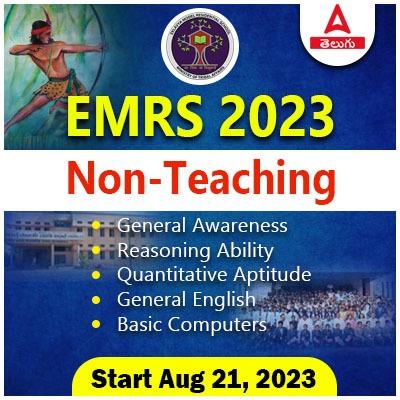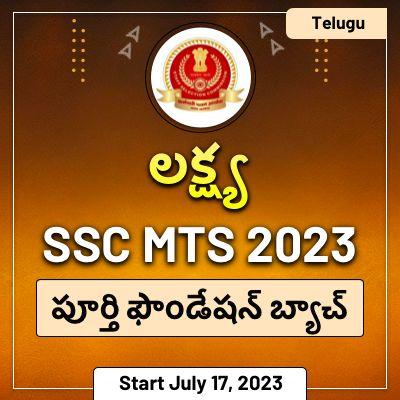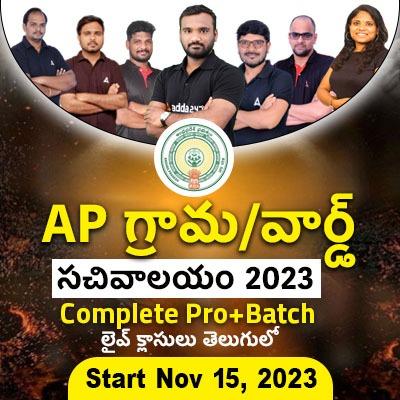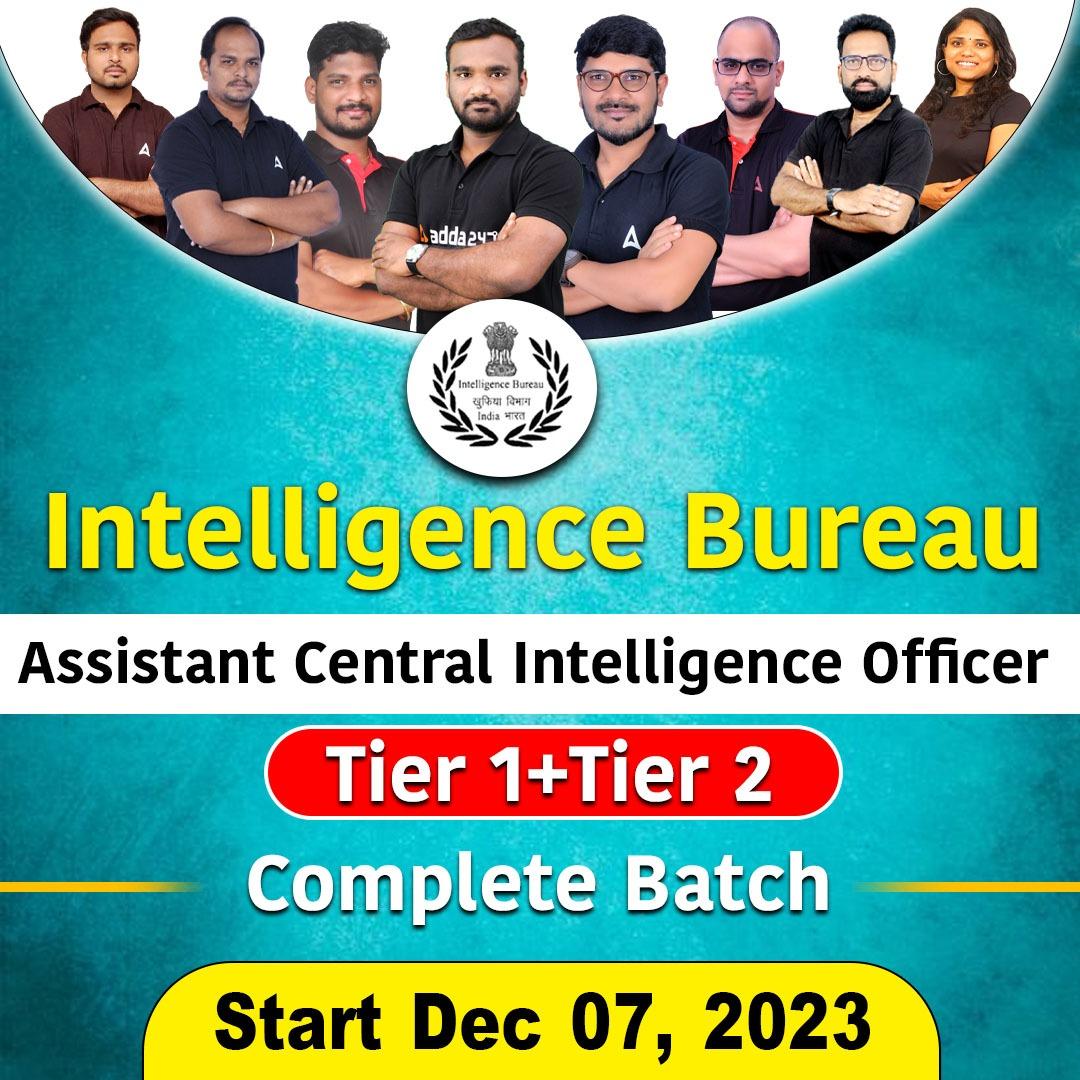
ఆంధ్రప్రదేశ్ మరియు తెలంగాణ లో అత్యంత ముఖ్యమైన మరియు ప్రతిష్టాత్మకమైన పరీక్షలు గ్రూప్-1,2,3 అలాగే UPSC లలోనికి చాలా మంది ఆశావహులు ఈ ప్రతిష్టాత్మక ఉద్యోగాల్లో కి ప్రవేశించడానికి ఆసక్తి చూపుతారు.దీనికి పోటీ ఎక్కువగా ఉండడం కారణంగా, అధిక వెయిటేజీ సంబంధిత సబ్జెక్టులను ఎంచుకుని స్మార్ట్ అధ్యయనంతో ఉద్యోగం పొందవచ్చు. ఈ పరీక్షలలో ముఖ్యమైన అంశాలు అయిన పౌర శాస్త్రం , చరిత్ర , భూగోళశాస్త్రం, ఆర్ధిక శాస్త్రం, సైన్సు మరియు విజ్ఞానం, సమకాలీన అంశాలు చాల ముఖ్యమైన పాత్ర పోషిస్తాయి. కాబట్టి Adda247, ఈ అంశాలకి సంబంధించిన కొన్ని ముఖ్యమైన ప్రశ్నలను మీకు ప్రతిరోజు క్విజ్ రూపంలో అందిస్తుంది. ఈ పరీక్షలపై ఆసక్తి ఉన్న అభ్యర్థులు దిగువ ఉన్న ప్రశ్నలను పరిశీలించండి.
ప్రశ్నలు
Q1. దిగువ జతలను పరిగణనలోకి తీసుకోండి.
- సుధారక్ : గోపాల్ గణేష్ అగార్కర్
- భారత సమాజ సేవకులు : నారాయణ్ మల్హర్ జోషి
- సోషల్ సర్వీస్ లీగ్ : గోపాలకృష్ణ గోఖలే
పైన ఇవ్వబడ్డ జతల్లో ఏది సరైనది?
(a) 1 మరియు 2
(b) 2 మరియు 3
(c) 1 మరియు 3
(d) 1 మాత్రమే
Q2. భారత సమాజ సేవకుల గురించి ఈ క్రింది ప్రకటనలను పరిశీలించండి
- సమాజం నుండి అంటరానితనం నిర్మూలించడమే ఈ సమాజం యొక్క లక్ష్యం
- హితవాద అనేది భారత సమాజ సేవకుల యొక్క ప్రచురణ.
- ఎం.జి. రణడే దీనితో అనుబంధం కలిగి ఉన్నారు.
పైన ఇవ్వబడ్డ ప్రకటనలలో ఏది సరైనది?
(a) 1 మరియు 2
(b) 2 మరియు 3
(c) 1 మరియు 3
(d) 1 మాత్రమే
Q3. ఈ క్రింది వారిలో ఎవరిని లోక హితవాది అని పిలిచేవారు ?
(a) గోపాలహరి దేశ్ ముఖ్
(b) జ్యోతిబా ఫూలే
(c) బాల గంగాధరతిలక్
(d) లాలా లజపతిరాయ్
Q4. ఈ క్రింది వాటిలో జ్యోతిబా ఫూలే యొక్క సాహిత్య రచనలు ఏవి?
- సర్వజనిక్
- సత్య ధర్మం
- గులాంగిరి
- దిగ్దర్శన్
దిగువ నుంచి సరైన కోడ్ ఎంచుకోండి:
(a) 1, 2, 3
(b) 2, 3, 4
(c) 1, 3, 4
(d) 1, 2, 3, 4
Q5. పరమహంస మండలికి సంబంధించి ఈ క్రింది ప్రకటనలను పరిశీలించండి.
- ఒక దేవుడిని ఆరాధించాలని వారు బోధించారు.
- నిజమైన మతం ప్రేమ మరియు నైతిక ప్రవర్తనపై ఆధారపడి ఉంటుందని వారు విశ్వసించారు.
- వారు వితంతు పునర్వివాహం చేసుకున్నప్పటికి మహిళల విద్య సమస్యలను పరిష్కరించడంలో విఫలమయ్యారు.
పైన ఇవ్వబడ్డ ప్రకటనలలో ఏది సరైనది?
(a) 1 మరియు 2
(b) 2 మరియు 3
(c) 1 మరియు 3
(d) 1 మాత్రమే
Q6. దిగువ ప్రకటనలను పరిగణనలోకి తీసుకోండి.
- మహిళా విద్య కోసం శక్తివంతమైన ఉద్యమం ఫలితంగా కలకత్తాలో బెతూన్ పాఠశాల స్థాపించబడింది.
- ఈశ్వర్ చంద్ర విద్యాసాగర్ బెతూన్ పాఠశాల కార్యదర్శిగా ఉన్నారు.
పైన ఇవ్వబడ్డ ప్రకటనల్లో ఏది సరైనది?
(a) 1 మాత్రమే
(b) 2 మాత్రమే
(c) 1 మరియు 2 రెండూ
(d) 1 , 2 కాదు
Q7. హెన్రీ వివియన్ డెరోజియో స్థాపించిన యంగ్ బెంగాల్ ఉద్యమానికి సంబంధించిన ఈ క్రింది ప్రకటనలను పరిగణనలోకి తీసుకోండి
- సామాజిక, ఆర్థిక మరియు రాజకీయ ప్రశ్నలపై రామోహన్ రాయ్ యొక్క ప్రభుత్వ విద్య సంప్రదాయాన్ని డెరోజియన్లు ముందుకు తీసుకువెళ్లారు.
- అధిక స్థాయి సర్వీసుల్లో భారతీయులను చేర్చాలని డీరోజియన్లు డిమాండ్ చేశారు
- డెరోజియన్లు తమ సమస్యలను లేవనెత్తడానికి ప్రజలతో బలమైన సంబంధాన్ని కలిగి ఉన్నారు
పైన ఇవ్వబడ్డ ప్రకటనలలో ఏది సరైనది?
(a) 1 మరియు 2
(b) 2 మరియు 3
(c) 1 మరియు 3
(d) 1 మాత్రమే
Q8. ప్రార్థన సమాజ్ కు సంబంధించి దిగువ ప్రకటనలను పరిగణనలోకి తీసుకోండి.
- ఏకధర్మవాదానికి ప్రాధాన్యత ఇవ్వబడింది, కానీ మొత్తం మీద, సమాజం మతం కంటే సామాజిక సంస్కరణల పై ఎక్కువ శ్రద్ధ చూపించారు.
- సమాజ్ విద్యా మరియు హిందూ ధర్మాన్ని ప్రతిఘటించే బోధనలను ఎక్కువగా నమ్మడం జరిగింది.
- మహాదేవ్ గోవింద్ రణదే ప్రార్థన సమాజ్ యొక్క స్థాపకుడు.
పైన ఇవ్వబడ్డ ప్రకటనలలో ఏది సరైనది?
(a) 1 మరియు 2
(b) 2 మరియు 3
(c) 3 మాత్రమే
(d) 1 మాత్రమే
Q9. బ్రహ్మ సమాజానికి సంబంధించి ఈ క్రింది ప్రకటనలను పరిశీలించండి
- ఇది సమాజంలో మహిళలకు గౌరవనీయమైన హోదా కోసం పనిచేసింది మరియు సతిని ఖండించింది
- ఇది కులతత్వాన్ని, అంటరానితనాన్ని ఖండించింది.
- బ్రహ్మ సమాజ్ ప్రభావం బ్రిటిష్ ఇండియా యొక్క అన్ని మూలలకు చాలా త్వరగా వ్యాపించింది.
పైన ఇవ్వబడ్డ ప్రకటనలలో ఏది సరైనది?
(a) 1 మరియు 2
(b) 2 మరియు 3
(c) 3 మాత్రమే
(d) 1 మాత్రమే
Q10. 19వ శతాబ్దంలో, ఈ క్రింది అంశాలలో ఏది భారతీయ పెట్టుబడిదారీ వర్గం యొక్క ఎదుగుదలను ఉత్తమంగా వివరిస్తుంది?
(a) బొంబాయి నుండి ఈస్టిండియా కంపెనీ నల్లమందు వ్యాపారం.
(b) 1857 తిరుగుబాటు తరువాత మొఘల్ సామ్రాజ్యం విచ్ఛిన్నం.
(c) జమీందారీ వ్యవస్థను ప్రవేశపెట్టడం.
(d) భారత జాతీయ కాంగ్రెస్ ఏర్పాటు.
adda247 అప్లికేషన్ ను డౌన్లోడ్ చేసుకోడానికి ఇక్కడ క్లిక్ చెయ్యండి
ఆన్లైన్ లైవ్ క్లాసుల కొరకు ఇక్కడ క్లిక్ చేయండి
సమాధానాలు
S1.Ans.(d)
Sol. Sudharak : Gopal Ganesh Agarkar
The Servants of India Society: Gopal Krishna Gokhale
Social Service League: Narayan Malhar Joshi
S2.Ans.(b)
Sol. Gopal Krishna Gokhale (1866-1915), a liberal leader of the Indian National Congress, founded the Servants of India Society in 1905 with the help of M.G. Ranade. The aim of the society was to train national missionaries for the service of India; to promote, by all constitutional means, the true interests of the Indian people; and to prepare a cadre of selfless workers who were to devote their lives to the cause of the country in a religious spirit. In 1911, the Hitavada began to be published to project the views of society. The society chose to remain aloof from political activities and organizations like the Indian National Congress. After Gokhale’s death (1915), Srinivasa Shastri took over as president. Society still continues to function, though with a shrunken base, at many places in India. It works in the field of education, providing ashram type of schools for tribal girls and balwadis at many places
S3.Ans.(a)
Sol. Gopalhari Deshmukh (1823-1892) was a social reformer and rationalist from Maharashtra. He held the post of a judge under the British raj but wrote for a weekly Prabhakar under the pen name of Lokahitawadi on social reform issues. He advocated a reorganization of Indian society on rational principles and modern, humanistic, secular values. He attacked Hindu orthodoxy and supported social and religious equality. He wrote against the evils of the caste system
S4.Ans.(a)
Sol. Jyotiba Phule (1827-1890), born in Satara, Maharashtra, belonged to the mali (gardener) community and organized a powerful movement against upper caste domination and brahminical supremacy. Phule founded the Satyashodhak Samaj (Truth Seekers’ Society) in 1873, with the leadership of the samaj coming from the backward classes, malis, telis, kunbis, saris, and dhangars. The main aims of the movement were (i) social service, and (ii) the spread of education among women and lower caste people. Phule’s works, Sarvajanik Satyadharma and Gulamgiri, became sources of inspiration for the common masses
Digdarshan :
Balshastri Jambhekar (1812-1846) was a pioneer of social reform through journalism in Bombay; he attacked brahminical orthodoxy and tried to reform popular Hinduism. He started the newspaper Darpan in 1832. Known as the father of Marathi journalism, Jambhekar used the Darpan to awaken the people to an awareness of social reforms, such as widow remarriage, and to instill in the masses a scientific approach to life. In 1840, he started Digdarshan which published articles on scientific subjects as well as history
S5.Ans.(a)
Sol. Founded in 1849 in Maharashtra, the founders of the Paramahansa Mandali—Dadoba Pandurang, Mehtaji Durgaram, and others—began as a secret society that worked to reform Hindu religion and society in general. The ideology of the society was closely linked to that of the Manav Dharma Sabha. Besides believing that one god should be worshipped, society also said real religion is based on love and moral conduct. Freedom of thought was encouraged as was rationality. The founders of the mandali were primarily interested in breaking caste rules. At their meetings, food cooked by lower caste people was taken by the members. This mandalis also advocated widow remarriage and women’s education. Branches of Paramahansa Mandali existed in Poona, Satara, and other towns of Maharashtra.
S6.Ans.(c)
Sol. Both are correct
S7.Ans.(a)
Sol. During the late 1820s and early 1830s, there emerged a radical, intellectual trend among the youth in Bengal, which came to be known as the ‘Young Bengal Movement. A young Anglo-Indian, Henry Vivian Derozio (1809-31), who taught at the Hindu College from 1826 to 1831, was the leader and inspirer of this progressive trend. Drawing inspiration from the great French Revolution, Derozio inspired his pupils to think freely and rationally, question all authority, love liberty, equality, and freedom, and oppose decadent customs and traditions.
The main reason for their limited success was the prevailing social conditions at that time, which were not ripe for the adoption of radical ideas. Further, there was no support from any other social group or class. The Derozians lacked any real link with the masses; for instance, they failed to take up the peasants’ cause. In fact, their radicalism was bookish in character. But, despite their limitations, the Derozians carried forward Rammohan Roy’s tradition of public education on social, economic, and political questions. For instance, they demanded induction of Indians in higher grades of services, protection of ryots from oppressive zamindars, better treatment to Indian labor abroad in British colonies, revision of the Company’s charter, freedom of the press, and trial by jury
S8.Ans.(c)
Sol. In 1867, Keshab Chandra Sen helped Atmaram Pandurang found the Prarthana Samaj in Bombay. Earlier, the Brahmo ideas spread in Maharashtra. A precursor of the Prarthana Samaj was the Paramahansa Sabha, something like a secret society to spread liberal ideas and encourage the breakdown of caste and communal barriers. Mahadeo Govind Ranade (1842-1901), joined the samaj in 1870
The emphasis was on monotheism, but on the whole, the samaj was more concerned with social reforms than with religion. The Prarthana Sabha was very attached to the bhakti cult of Maharashtra. The samaj relied on education and persuasion and not on confrontation with Hindu orthodoxy. There was a four-point social agenda also: (i) disapproval of the caste system, (ii) women’s education, (iii) widow remarriage, and (iv) raising the age of marriage for both males and females.
S9.Ans.(a)
Sol. In matters of social reform, the Samaj attacked many dogmas and superstitions. It condemned the prevailing Hindu prejudice against going abroad. It worked for a respectable status for women in society—condemned sati, worked for the abolition of the purdah system, discouraged child marriage, and polygamy, crusaded for widow remarriage, and for provisions of educational facilities. It also attacked casteism and untouchability though in these matters it attained only limited success. The influence of the Brahmo Samaj, however, did not go much beyond Calcutta and, at most, Bengal. It did not have a lasting impact.
S10.Ans.(a)
Sol. Source: Themes in Indian History – II
Option (a) is the correct answer.
Bombay was the commercial capital of colonial India. As the premier port on the west coast, it was the center of international trade. By the end of the nineteenth
century, half the imports and exports of India passed through Bombay. One important item of this trade was opium that the East India Company exported to China. Indian merchants and middlemen supplied and participated in this trade and they helped integrate Bombay’s economy directly to Malwa, Rajasthan, and Sind where opium was grown. This collaboration with the Company was profitable and led to the growth of an Indian capitalist class.
Bombay’s capitalists came from diverse communities such as Parsi, Marwari, Konkani Muslim, Gujarati Bania, Bohra, Jew, and Armenian.
కొన్ని ముఖ్యమైన లింకులు
- adda247 APP ను డౌన్లోడ్ చేసుకోడానికి ఇక్కడ క్లిక్ చెయ్యండి
- Andhra Pradesh State GK PDF డౌన్లోడ్ చేసుకొనుటకు ఇక్కడ క్లిక్ చేయండి
- ఆంధ్ర ప్రదేశ్ జాగ్రఫీ కి సంబంధించిన ముఖ్యమైన ప్రశ్నల కొరకు ఇక్కడ క్లిక్ చేయండి
- 2 జూన్ 2021 యొక్క కరెంటు అఫైర్స్ కొరకు ఇక్కడ క్లిక్ చేయండి
- weekly మరియు monthly కరెంటు అఫైర్స్ pdf డౌన్లోడ్ చేసుకొనుటకు ఇక్కడ క్లిక్ చేయండి















